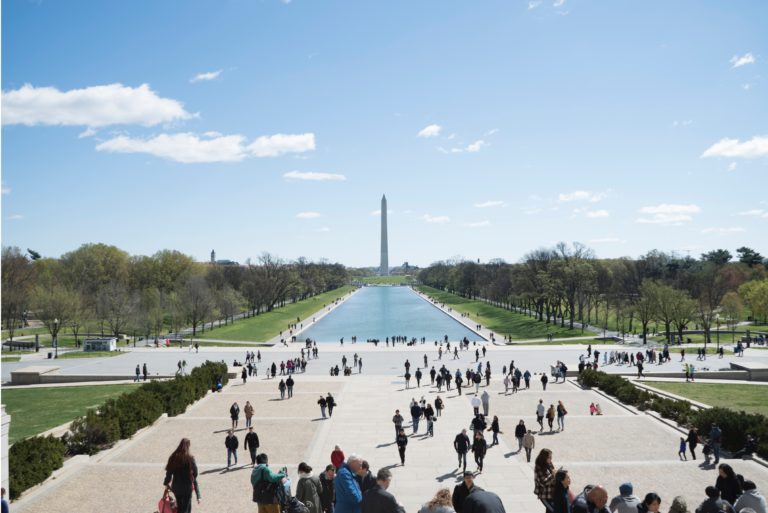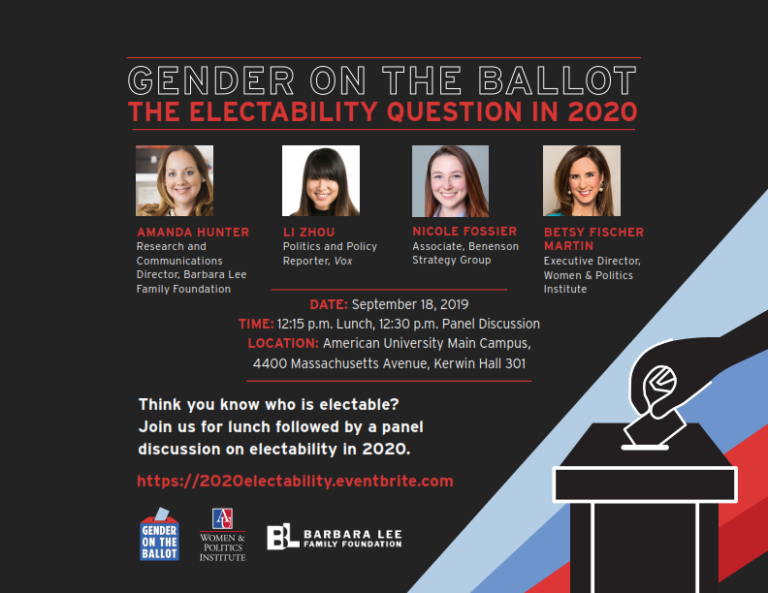In 2018, teachers across the nation went on strike in order to demand higher…
From Our Experts: Hopes and Resolutions for 2020 and Beyond

As we say goodbye to 2019 and look towards the year ahead, we asked our Gender on the Ballot experts what they were looking forward to – or hoped to see – in 2020 when it comes to gender and politics. Here’s what they told us:
Betsy Fischer Martin, Executive Director, American University’s Women and Politics Institute
I am looking forward to seeing the positive impact that having six women run for the Democratic presidential nomination will have on young women and their political aspirations. And during this centennial celebration of women’s suffrage, I am especially looking forward to seeing my 18 year-old daughter cast her first vote for President of the United States.
Nicole Carlsburg, Executive Director, The Barbara Lee Family Foundation
While 2018 saw a record number of women elected to Congress, we’ve plateaued when it comes to the number of women governors: there have never been more than 9 women serving as the chief executive of their state at one time. Let’s hope that, after November 2020, we hit double digits. After all, we know the idea that women aren’t as electable as their male counterparts is a myth.
Atima Omara, President, Omara Strategy Group
Despite the record number of women who ran and won public office and number of women to run for President in the Democratic primary, it’s still a challenge for women to run for office. Donors, voters, and strategists will still question “electability,” scrutinize women candidates’ records harder, and hold them to a higher standard on almost anything compared to their male counterparts. While it’s great to see more women candidates bring their full selves to the political process than ever, those who want to see a more reflective democracy must re-commit to naming and shaming the bias still deep in our political system in order to break the final barriers to higher office, especially to the highest office in the land in American politics.
Lucina Di Meco, Senior Gender Expert and Global Fellow, The Wilson Center
Since the 2016 elections, we’ve seen rising awareness of the important role that social media plays in shaping political campaigns – and even influencing elections. However, too little attention is being paid to understanding and counteracting the impact of online violence and gendered disinformation campaigns against women in politics. Let’s have 2020 be the year when we put resources and political will towards tackling this issue.
Amanda Fuchs Miller, President, Seventh Street Strategies
While the pontificating has been about whether we will have a woman President in 2020, and perhaps even an all-women presidential ticket, the commitment to women’s involvement in politics and policymaking must have a broader focus. Let’s resolve that we will all work towards a goal of having more women serving in policymaking positions – as Hill staff, as leadership on campaign teams, helping our next President prepare for their transition, as presidential appointees in the next Administration, as advocates lobbying for policy change, and as journalists covering politics – in addition to having more women running for, and winning, elected positions. Until there is gender parity across sectors, women’s issues won’t be at the forefront, female candidates won’t win, and media coverage will continue to be biased.
Lucy Gettman, Executive Director, Women In Government, Inc.
In 2020, let’s increase the number of women State Legislators and fuel the glidepath to gender parity in Congress at the same time. Nearly half (45%) of the women in Congress were State Legislators first, making state political leadership the most robust pathway to Washington, DC. Electing more women at the state level is a two-fer!
Amanda Hunter, Research and Communications Director, The Barbara Lee Family Foundation
There have been six Democratic primary debates, with almost 800 questions asked by moderators. Of those questions, only 5.6% have been about so-called “women’s issues” like equal pay, parental leave, and affordable childcare, despite the fact that those are issues that affect everyone—not just women. There are six Democratic presidential primary debates, not to mention three general election presidential debates, scheduled for 2020: Let’s hope “women’s issues” get the attention they deserve.
Cynthia Terrell, Founder and Executive Director, RepresentWomen
2020 marks the 150th anniversary of the 15th Amendment, which granted men of color the right to vote, and the 100th anniversary of the 19th Amendment, which granted the right of suffrage to most women. It would be another 40 years until women of all races were enfranchised. As we observe these anniversaries, and enter a new decade, it’s vital that we remember the lessons of the movement for suffrage and embrace systemic strategies to advance women’s representation and leadership in the United States. Recruitment targets, ranked choice voting, & modern legislative practices are key to accelerating progress toward a democracy that reflects the people it serves.
Shaunna Thomas, Co-Founder and Executive Director, UltraViolet
In 2020, women of color and their allies will defeat the forces trying to suppress our voices as voters and candidates. Together, we’ll make sure issues of gender justice like abortion access, combatting maternal mortality, and ending sexual assault and harassment are front and center, and we’ll end the false media narrative that women are unelectable once and for all.






